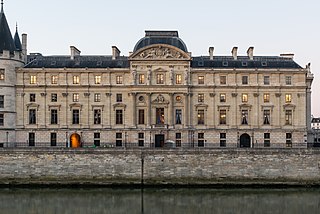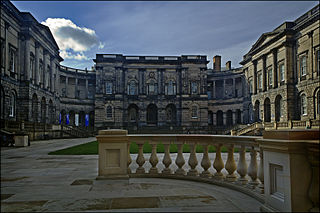Related Research Articles

A court is any person or institution,often as a government institution,with the authority to adjudicate legal disputes between parties and carry out the administration of justice in civil,criminal,and administrative matters in accordance with the rule of law. In both common law and civil law legal systems,courts are the central means for dispute resolution,and it is generally understood that all people have an ability to bring their claims before a court. Similarly,the rights of those accused of a crime include the right to present a defense before a court.

The United Kingdom has three distinctly different legal systems,each of which derives from a particular geographical area for a variety of historical reasons:English law,Scots law,Northern Ireland law,and,since 2007,calls for a fourth type,that of purely Welsh law as a result of Welsh devolution,with further calls for a Welsh justice system.

The Court of Cassation is the supreme court for civil and criminal cases in France. It is one of the country's four apex courts,along with the Council of State,the Constitutional Council and the Jurisdictional Disputes Tribunal.

Sir Donald Neil MacCormick was a Scottish legal philosopher and politician. He was Regius Professor of Public Law and the Law of Nature and Nations at the University of Edinburgh from 1972 until 2008. He was a Member of the European Parliament 1999–2004,member of the Convention on the Future of Europe,and officer of the Scottish National Party.

A sheriff court is the principal local civil and criminal court in Scotland,with exclusive jurisdiction over all civil cases with a monetary value up to £100,000,and with the jurisdiction to hear any criminal case except treason,murder,and rape,which are in the exclusive jurisdiction of the High Court of Justiciary. Though the sheriff courts have concurrent jurisdiction with the High Court over armed robbery,drug trafficking,and sexual offences involving children,the vast majority of these cases are heard by the High Court. Each court serves a sheriff court district within one of the six sheriffdoms of Scotland. Each sheriff court is presided over by a sheriff,who is a legally qualified judge,and part of the judiciary of Scotland.

District courts are a category of courts which exists in several nations,some call them "small case court" usually as the lowest level of the hierarchy.

Edinburgh Law School,founded in 1707,is a school within the University of Edinburgh,Scotland,United Kingdom dedicated to research and teaching in law. It is located in the historic Old College,the original site of the University. Two of the twelve currently sitting Supreme Court of the United Kingdom justices are graduates of Edinburgh,including the current President and Deputy President.

The courts of Scotland are responsible for administration of justice in Scotland,under statutory,common law and equitable provisions within Scots law. The courts are presided over by the judiciary of Scotland,who are the various judicial office holders responsible for issuing judgments,ensuring fair trials,and deciding on sentencing. The Court of Session is the supreme civil court of Scotland,subject to appeals to the Supreme Court of the United Kingdom,and the High Court of Justiciary is the supreme criminal court,which is only subject to the authority of the Supreme Court of the United Kingdom on devolution issues and human rights compatibility issues.

The Supreme Court of the United Kingdom is the final court of appeal in the United Kingdom for all civil cases,and for criminal cases originating in England,Wales and Northern Ireland. As the United Kingdom's highest appellate court for these matters,it hears cases of the greatest public or constitutional importance affecting the whole population.

In Scotland a sheriff principal is a judge in charge of a sheriffdom with judicial,quasi-judicial,and administrative responsibilities. Sheriffs principal have been part of the judiciary of Scotland since the 11th century. Sheriffs principal were originally appointed by the monarch of Scotland,and evolved into a heritable jurisdiction before appointment was again vested in the Crown and the monarch of the United Kingdom following the passage of the Heritable Jurisdictions (Scotland) Act 1746.

Thomas Eugene Baker is a constitutional law scholar,Professor of Law,and founding member of the Florida International University College of Law. With four decades of teaching experience,Baker has authored eighteen books,including two leading casebooks,has published more than 200 scholarly articles in leading law journals,and has received numerous teaching awards.

In most legal jurisdictions,a supreme court,also known as a court of last resort,apex court,and highcourt of appeal,is the highest court within the hierarchy of courts. Broadly speaking,the decisions of a supreme court are binding on all other courts in a nation and are not subject to further review by any other court. Supreme courts typically function primarily as appellate courts,hearing appeals from decisions of lower trial courts,or from intermediate-level appellate courts. A Supreme Court can also,in certain circumstances,act as a court of original jurisdiction,however,this is typically limited to constitutional law.
Legal education in the United Kingdom is divided between the common law system of England and Wales and Northern Ireland,and that of Scotland,which uses a hybrid of common law and civil law.

The School of Law at the University of Glasgow provides undergraduate and postgraduate courses in Law,and awards the degrees of Bachelor of Laws,Master of Laws,LLM by Research,Master of Research (MRes) and Doctor of Philosophy,the degree of Doctor of Laws being awarded generally only as an honorary degree.

The University of Aberdeen School of Law is the law school of University of Aberdeen,located in Aberdeen,Scotland. Established in 1495,it is consistently ranked among the top 10 law schools in the United Kingdom.
Iain Duncan Macphail,Lord Macphail was a Scottish lawyer and Senator of the College of Justice,a judge of the country's Supreme Courts.

The judiciary of Italy is composed of courts and public prosecutor offices responsible for the administration of justice in the Italian Republic. Both bench judges and public prosecutor belong to the magistracy,that is to say a public office only accessible to Italian citizens who hold an Italian Juris Doctor and have successfully partaken in one of the relevant competitive public examinations organised by the Ministry of justice. The magistracy embodies the judicial power,one of the three independent powers of the State in which no hierarchy exists.

Scots law is the legal system of Scotland. It is a hybrid or mixed legal system containing civil law and common law elements,that traces its roots to a number of different historical sources. Together with English law and Northern Irish law,it is one of the three legal systems of the United Kingdom. Scots law recognises four sources of law:legislation,legal precedent,specific academic writings,and custom. Legislation affecting Scotland and Scots law is passed by the Scottish Parliament on all areas of devolved responsibility,and the United Kingdom Parliament on reserved matters. Some legislation passed by the pre-1707 Parliament of Scotland is still also valid.
In law,an appeal is the process in which cases are reviewed by a higher authority,where parties request a formal change to an official decision. Appeals function both as a process for error correction as well as a process of clarifying and interpreting law. Although appellate courts have existed for thousands of years,common law countries did not incorporate an affirmative right to appeal into their jurisprudence until the 19th century.
William Adam Wilson FRSE was a Scottish lawyer who served as Professor of Scots Law at the University of Edinburgh. As an author he was known as W. A. Wilson and informally as Bill Wilson.
References
- 1 2 3 4 5 "Professor Neil Walker". University of Edinburgh. Archived from the original on 3 June 2013. Retrieved 24 October 2009.
- ↑ "Neil Walker: Police culture and organisation". University of Strathclyde Library. Retrieved 24 October 2009.
- 1 2 "News Release: Review of Civil Appeal". Scottish Government. 15 December 2008. Retrieved 24 October 2009.
- 1 2 "Review of final appellate jurisdiction". Scots Law News. 24 December 2008. Archived from the original on 27 September 2011. Retrieved 24 October 2009.
